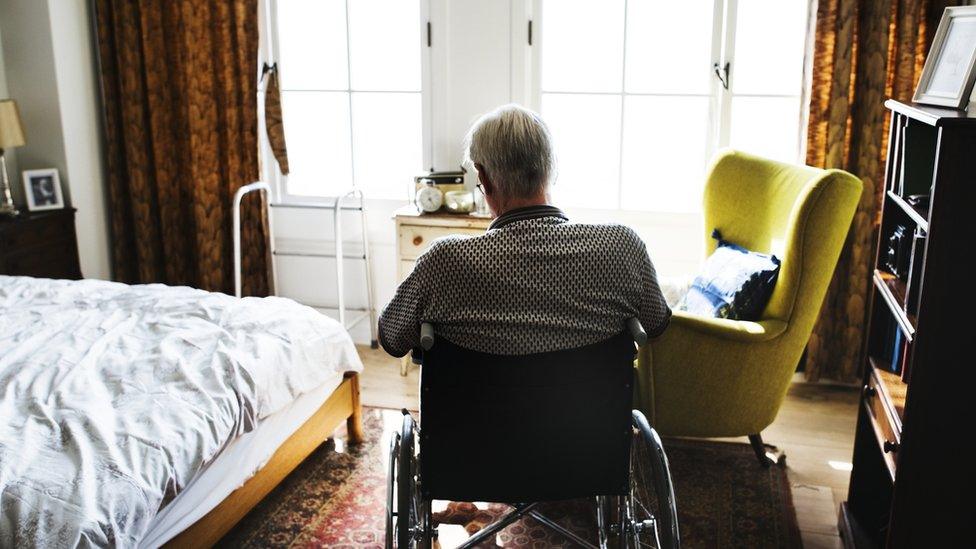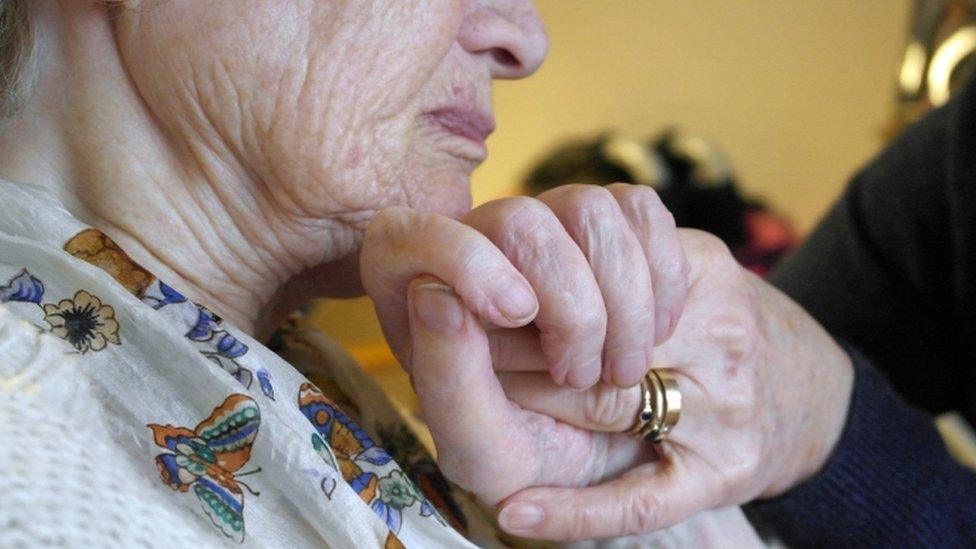Ministers considered cap on care costs before coronavirus outbreak
- Published
- comments

A personal cap on care costs in England was being considered by ministers prior to the coronavirus outbreak, the BBC has learned.
The idea was raised during talks with Sir Andrew Dilnot, the former UK statistics chief, whose proposals for a cap were abandoned in 2017.
It is understood a specific social care tax was among options discussed to cover the costs.
Details were not agreed by the March Budget and were put off till autumn.
A senior figure involved in the talks, which took place in January and February, said there had been "90% agreement" on revisiting Sir Andrew's model.
Prime Minister Boris Johnson is understood to have taken part in the discussions.
Sir Andrew's proposals would have introduced a more generous means-test for government funding, as well as a lifetime limit on social care costs.
They were put into law in 2014 under the Conservative-Liberal Democrat coalition, but delayed and then eventually ditched under David Cameron.
His successor, Theresa May, later suggested and then abandoned a form of the proposals in 2017.
Unlike health care, social care is not generally provided for free. In England, anyone with assets over £23,250 is expected to contribute to costs.
Local authorities determine their own means-tests for those receiving care at home, which have to be as generous as the test for care homes.

A SIMPLE GUIDE: How do I protect myself?
AVOIDING CONTACT: The rules on self-isolation and exercise
LOOK-UP TOOL: Check cases in your area
MAPS AND CHARTS: Visual guide to the outbreak
VIDEO: The 20-second hand wash

Alongside adopting a version of the Dilnot model, ministers are considering making changes to the way the social care sector is funded, which is under severe strain after years of cuts to local council budgets.
One option is to hand money more directly to English care homes, rather than the current model of providing funding through local authorities.
Earlier this month, £600m in government funding to help with infection control in care homes was given to councils on a ring-fenced basis.
Health Secretary Matt Hancock hinted earlier this week that a similar model could be an option for long-term financing of the system.
'Dignity and respect'
Senior sources have also told the BBC the Conservatives seriously considered including providing free personal care in their manifesto for last year's election.
However, the idea was ditched as the party wanted to rule out rises to income tax, VAT or national insurance.
The plan for free personal care, which is already available in Scotland, could have cost as much as £10bn in the first year. Some care costs are capped in Wales and home care is free for the over-75s in Northern Ireland.
A source involved in the discussions said: "No one wanted to raise taxes, so we put it off."
The party's manifesto eventually promised extra funding for social care in England and to pursue cross-party talks on long-term changes to the sector.
Ministers acknowledge reform is long overdue, with a senior figure saying: "It is obvious now that there is a need for change."
Downing Street would not comment on the manifesto.
But a government spokesperson said ministers remain committed to bringing forward a social care plan "so everybody is treated with dignity and respect, and nobody has to sell their home to pay for care".
"The health secretary has already sought views from across Parliament, but this is one of the most complex issues we face, and it is right we take time to develop a fair, sustainable solution," they added.
"Care homes will continue to get all the support they need to tackle the impacts of the pandemic, with £3.2bn to help address pressures in adult social care and £600m to control infections in care homes."
- Published7 December 2017
